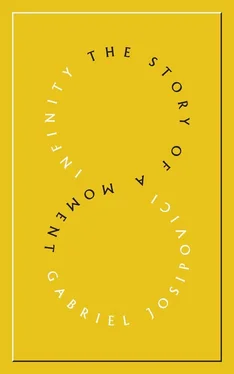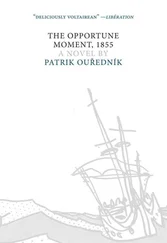Gabriel Josipovici - Infinity - The Story of a Moment
Здесь есть возможность читать онлайн «Gabriel Josipovici - Infinity - The Story of a Moment» весь текст электронной книги совершенно бесплатно (целиком полную версию без сокращений). В некоторых случаях можно слушать аудио, скачать через торрент в формате fb2 и присутствует краткое содержание. Год выпуска: 2012, ISBN: 2012, Издательство: Carcanet Press Ltd., Жанр: Современная проза, на английском языке. Описание произведения, (предисловие) а так же отзывы посетителей доступны на портале библиотеки ЛибКат.
- Название:Infinity: The Story of a Moment
- Автор:
- Издательство:Carcanet Press Ltd.
- Жанр:
- Год:2012
- ISBN:9781847776440
- Рейтинг книги:4 / 5. Голосов: 1
-
Избранное:Добавить в избранное
- Отзывы:
-
Ваша оценка:
- 80
- 1
- 2
- 3
- 4
- 5
Infinity: The Story of a Moment: краткое содержание, описание и аннотация
Предлагаем к чтению аннотацию, описание, краткое содержание или предисловие (зависит от того, что написал сам автор книги «Infinity: The Story of a Moment»). Если вы не нашли необходимую информацию о книге — напишите в комментариях, мы постараемся отыскать её.
Infinity: The Story of a Moment — читать онлайн бесплатно полную книгу (весь текст) целиком
Ниже представлен текст книги, разбитый по страницам. Система сохранения места последней прочитанной страницы, позволяет с удобством читать онлайн бесплатно книгу «Infinity: The Story of a Moment», без необходимости каждый раз заново искать на чём Вы остановились. Поставьте закладку, и сможете в любой момент перейти на страницу, на которой закончили чтение.
Интервал:
Закладка:
— What did he mean, a disastrous lure?
— That is the phrase he used. A disastrous lure. We were driving to Palestrina one spring day. He had told me the story of Lord Berners and his trips into the Campagna in his big car and he said –
— What story of Lord Berners?
— Lord Berners, Mr Pavone said, lived in Rome and Naples for a while. He had a harpsichord installed in the back of his Rolls and while his chauffeur drove through the quiet countryside of the Campagna he would put on one of the African masks he had acquired and play the music of Pergolesi and Bach, of Couperin and Rameau, especially the very fast music of these composers, on the harpischord in the back of the car. They would drive through peaceful villages which had never seen a car before, never mind a car with a harpsichord in the back being played by a man in an African mask, and the villagers would cross themselves and go back into their houses. The harpsichord had been specially built to go into his car, Mr Pavone said, and –
— Never mind Lord Berners. You were talking about the phrase ‘a disastrous lure’, I reminded him.
— You asked me what story, he said.
— All right, I said. Go on.
He was silent.
— Go on, I said.
— I can’t remember, he said, hanging his head.
— The idea of opera, I encouraged him.
— Ah yes, he said. The idea of opera. Opera, Massimo, he said to me, is the will o’ the wisp that has lured the modern composer to his doom. Because composers in the past wrote operas these people think that this is what they still have to do. But what they do not understand, Massimo, he said, is that there is such a thing as a cultural imperative. A cultural imperative, Massimo, he said. The cultural imperative of the Renaissance led to the composition of the mass; the cultural imperative of the Baroque led to the composition of oratorio. That is because these were still cohesive societies. The cultural imperative of Romanticism led to the concerto, to lieder, and to Romantic opera, the solitary lament of the solitary self. Romantic opera, he said, is entertainment for the masses, for the solitary individuals who make up the masses. It is dressed up as passion, the passion of desire, the passion of love and the losing of love, for which the only remedy is death. But that is only dressing up, Massimo, he said, only camouflage. What it is really about is the loss of society. That is what these operas really lament, he said, the loss of the spirit of society which inspired the masses and oratorios of the past. Modern opera, he said, either tries to pretend that the old forms are still viable, or it tries to reinvent the form. Perhaps in the future someone will come who will reinvent opera altogether, but for the moment it is impossible. Serious composers will always come to grief with opera today, he said as we were driving to Palestrina, no matter how they set about their task, whether, like Henze and Britten, by trying to breathe life into moribund forms, or, like Nono, by getting his architect friends to build him a special box for his opera and his intellectual friends to write him incomprehensible texts for his opera, texts made up of Greek and German, because for Italians, Massimo, he said, to be able to refer to Greek and German mythology and especially to be able to quote in the original Greek and German, shows that you are a cultured man, shows that you have finally left the hovel of the peasant and entered the city of Culture. All a disaster, he said. Henze a disaster. Britten a disaster. Dallapiccola a disaster. Nono a disaster. Berio a disaster. Bussotti a disaster. Have you noticed, by the way, Massimo, he said, how many composers have names starting with the letter B? To get a comprehensive knowledge of Western music, he said, you need only listen to works by composers whose names begin with B. That is itself a reason, he said, if your name does not begin with B, for wishing to escape from that tradition. Do you know why all these modern composers want to write operas? he said. It is because they feel they have suffered too much, hidden away in their rooms writing music, and now they want to come up onto the stage like Caruso and Pavarotti and take their bow and have lovely ladies swoon at their feet at the reception afterwards and invite them back to their beds. They feel they have paid their dues to the Muses in all the years of work in closed rooms by themselves with no lovely ladies interested in them and no fame and no money and so now they feel they are owed all this by society and by so feeling they give notice of their essentially petit bourgeois mentality and of their essential triviality. I had had my fill of wealth and fame and pretty ladies by the time I left Monte Carlo in 1927, he said, and I was only twenty-two, but these are men of fifty and sixty and they feel that their lives have not yet begun, so they write operas in order to be able to put down their pencils at last and jump into bed with pretty ladies who are not their wives, and of course some of them even manage to do that.
— What did he say about Monte Carlo?
— He said to me: At sixteen, Massimo, I had had enough of being a child. I had had an old-fashioned education of Latin, chess and fencing, and been given plenty of free time to develop my interests, I had learned all the essentials of sex from my cousin Lara and from the serving-girls, but now I wanted to stretch my wings. He said that he went to stay with a cousin of his in Monte Carlo and there he learned to play bridge and to gamble in the casino and to dance. Monte Carlo at the time, he said, was the haunt of the most elegant men in the world. Theo Rossi di Montelera was commonly regarded as the most elegant, he said, but to my mind a Frenchman, Guy de la Lagardière was even more elegant. The most elegant of all, however, was Prince Yusupof, who was said to have organised the murder of Rasputin. His was not so much a sartorial elegance, as an elegance of posture and movement. It was not the elegance of Fred Astaire, no, that was something quite different. Yusupof, he said, made one think of those long-haired Russian greyhounds whose every step evokes a spontaneous beauty and an unsurpassable elegance. It was in Monte Carlo, he said, that I found I had a talent for dancing, he told me, and also for writing waltzes and other dances of the time. I was soon in demand as a partner for many beautiful women, he said, and hostesses began to ask me to compose music for the bands that played at their houses. I sometimes played the piano at these soirées, he said, and partnered some of the older ladies at bridge. I seem to have needed very little sleep in those days, he said, because when the night was done and the others went home to their beds I stayed at the piano and wrote my music, and even when I went to bed, he said, it was rarely by myself, and as you know, Massimo, there is nothing less conducive to sleep than sharing your bed with someone. Soon, he said, I abandoned my cousin, much to his annoyance, and found a flat of my own, a beautiful flat, like all the flats of Monte Carlo, with a beautiful view of the sea and the mountains. I should have learned from that time, Massimo, he said to me as we were driving one day, after he had had his first stroke, I should have learned that the secret of writing music is not thinking but feeling happy and feeling full. When you are full of the smells and sounds of the world, he said, when you are full of passion for a beautiful woman, music is an overflow, and that is a guarantee of authenticity. What I wrote then was not worth a bean, he said, and no one ever imagined it was, but it had a natural quality which I then lost for thirty years and only rediscovered on my return from Nepal in 1949. This is a quality which cannot be learned, Massimo, he said, it is there or it is not there. When I subsequently went on my ethnographical trips to West Africa, he said, I immediately sensed that the most striking quality of the art I found there was not its abstraction or its primitiveness or even its beauty, but its authenticity: you had the feeling that it had to be like this and no other way. When I went to the territory of the Ife with Daniel Bernstein, who had been a pupil of Frobenius, he said, I felt that I had entered a world of which I had often dreamed but which Europe had been unable to provide for me. The bronze heads of the Ife and of course of the Benin region are now famous the world over, he said, but in those days they were only just beginning to be known. Frobenius was so struck by what he took to be the classicism of these heads, he said, that he posited a historical link with ancient Greece, ridiculous of course, the Ife and Benin heads have a warmth and a humanity, a grace and a graciousness that is quite missing from classical Greek heads. The most remarkable sculptures of the Ife, though, he said, the memory of which has never left me in the course of my life, are the stone sculptures found in the groves or religious sanctuaries that are dotted about the periphery of the city of Ife. There are remarkable standing figures, such as the one called the Gatekeeper, a hideous dwarfish creature who guards one of the groves and to whom the people still brought offerings when I was last there in 1932 and perhaps they still do today. But for me, he said, in the first expedition I undertook with my dear friend Daniel Bernstein in 1926, for me the most overwhelming object was a granite slab some two metres high by forty centimetres broad and about ten centimetres thick, with five holes drilled into its upper half, and which ethnologists have called the Shield. Why that should have made such an impression on me is difficult to understand, he said, but I felt the moment I saw it as though I was standing at the confluence of all the waters of the world, I felt an immense pressure on all sides, which was keeping me upright and keeping me stable, but only because the pressure was so evenly distributed. I have often thought of that moment, he said, I felt it again when I heard the great trumpets being sounded during my trip to Nepal, and of course I have felt it when composing the music I have written since that time. You feel, he said, as if at every moment you are going either to be crushed or swept away, but you also feel as if you are in touch with the secret pulse of the universe. It is an extraordinary sensation, he said, a compressing into the moment of everything that has ever been and ever will be. It is this that I look for in each sound I imagine, he said, it is this that is at the heart of every note.
Читать дальшеИнтервал:
Закладка:
Похожие книги на «Infinity: The Story of a Moment»
Представляем Вашему вниманию похожие книги на «Infinity: The Story of a Moment» списком для выбора. Мы отобрали схожую по названию и смыслу литературу в надежде предоставить читателям больше вариантов отыскать новые, интересные, ещё непрочитанные произведения.
Обсуждение, отзывы о книге «Infinity: The Story of a Moment» и просто собственные мнения читателей. Оставьте ваши комментарии, напишите, что Вы думаете о произведении, его смысле или главных героях. Укажите что конкретно понравилось, а что нет, и почему Вы так считаете.












